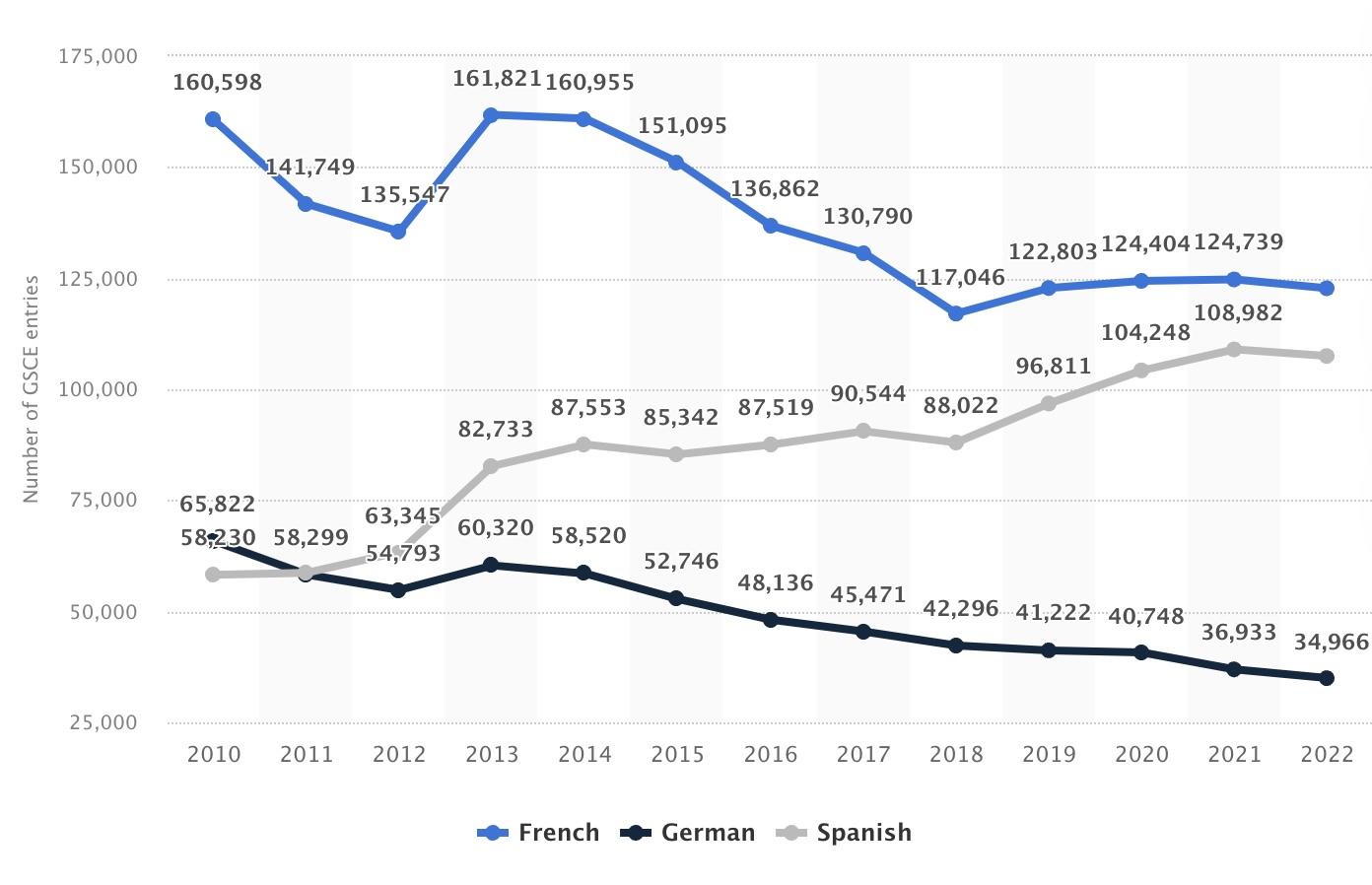Chapters
Germany is one of the economic driving forces in Europe, and a key player in European Union.
The UK and Germany are intrinsically linked, and as The Telegraph newspaper put it, ‘British suppliers and manufacturers are deeply integrated into the German industrial machine and enjoy the follow-through benefits of German exports to the rest of the world’.
German language can be useful for both jobs and travel prospects, but the state of German in school has taken a huge hit in recent years.
German has been declining since 2010 while those taking Spanish has increased. Spanish overtook German as the second most popular language in 2011
-Statista, Number of GSCE entries in French, German and Spanish in England from 2010 to 2022
The most noticeable trend in the 2022 GCSE and A Level results was the continuing, crashing decline of the popularity of modern languages. In 2022 there were approximately 122,739 high school students in England taking French at GCSE level, compared with 108,982 taking Spanish and a meagre 34,966 taking German. If you want to buck the trend you can check for German lessons online.

In 2013, the exam boards commissioned a study on why this decline in the popularity of languages was happening. Their research found that pupils perceived languages to be difficult to study, and, in particular, that they were difficult subjects in which to gain high grades. In the decade that has passed, it hasn't got much better.
One element which may account for the decline is that popular culture in the UK largely ignores our European partners and is now completely dominated by the USA: and Americans speak English (and indeed, our own language is constantly changing to adopt Americanisms). It is easy for young students to feel that all they will need in our US-dominated world is the same language.
Interestingly, more students are now choosing to learn Spanish. It is perceived to be an easier language to learn than German, but it is also the second language spoken by American TV cops and there is a strong Hispanic influence in US pop music. To some young people, Spanish has much more appeal.

Benefits of speaking German

Before establishing how to learn German online it is important to work out why you might want to do so. Brits often have something of a lax attitude towards other languages as we've already covered. Did you know that other than the United Kingdom, Germany has the most English speakers with 45.8 million?
So why learn German? when so many Germans already speak English? (Other than making the effort when you are travelling!)
- Strong Global Presence: German is the most widely spoken native language in Europe and the most widely spoken language in the European Union. It's also a key language for international business, meaning that German speakers may open the door to more opportunities in business and life.
- Career Opportunities: Proficiency in German can open up job opportunities in various fields, especially in industries like engineering, technology, science, and international business. Being able to speak German means that you may be able to work in the country or work closely with Germans and German companies.
- Academic Advancement: Learning German can provide access to a range of educational and scholarship opportunities, as German universities are known for their high-quality education. The fact that the number of people taking German is dropping means there is an opportunity for those students that do decide to study it, and it can provide a talking point for personal statements.
- Cultural Enrichment: Germany has a rich cultural heritage, with contributions to literature, music, philosophy, and art. Learning German allows you to engage with these cultural treasures more deeply. Germany has been a cultural and economic powerhouse for a long time now, and we've seen incredible artists and musicians in particular coming from the country.
- Travel and Exploration: Knowing German can enhance travel experiences in German-speaking countries such as Germany, Austria, and Switzerland. You can better communicate with locals and appreciate local culture.
- Intellectual Challenge: Learning a new language, especially one with grammatical complexity like German, challenges the mind and enhances cognitive abilities such as problem-solving and memory. German is a tricky language in a lot of ways, which may be a challenge throughout your education, but it is a good way to enhance your brain power.
- International Relations: Proficiency in German can be an asset in diplomacy, international relations, and NGOs, especially when dealing with German-speaking regions or collaborating with German organizations.
Want to start taking German lessons London? Try Superprof today!
Is learning German difficult?

We don't want to leave you under any illusions. German is a tough language to pick up, with a lot of differences when compared to English. If you're looking to learn to speak German quickly you can expect to spend a lot of time studying.
Here are some reasons why some people find German hard to learn:
- Grammatical Complexity - German has a complex grammatical structure, including a system of noun cases (nominative, accusative, dative, and genitive) that determines the function of words in a sentence. Noun declensions, adjective endings, and verb conjugations can be intricate and require precise agreement.
- Word Order - German has a fairly rigid word order, especially in comparison to English. The position of words in a sentence can affect the meaning, and understanding this word order can be challenging for learners.
- Pronunciation and Sound System - The German system includes unique sounds, such as the uvular "r" and the sharp "ch" sound, which can be difficult for non-native speakers to master. Additionally, the length and stress of vowels can change the meaning of words.
- Compound Words - German is known for its long compound words formed by combining several words into one. These compound words can be intimidating and difficult to decipher for beginners.
- Vocabulary - While there are similarities between English and German due to their shared Germanic roots, German vocabulary can be challenging, and some words may be significantly longer than their English equivalents. Even some German letters can be different as they are accented in certain ways.
- Articles and Gender - German nouns have gender (masculine, feminine, neuter), and the choice of articles and adjectives depends on the gender of the noun. Learning the gender of nouns can be challenging for non-native speakers.
- Difficult Sounds - The sounds and pronunciations of German words can be very difficult, and may involve learning to pronounce letters in a totally different way.
It's an intimidating language. Even just looking at a passage of German you can tell it is a difficult language to learn, but like every language, surrounding yourself with German will help you to pick it up.

What does a German GCSE involve?
So, what will you be studying exactly if you do choose to undertake a German GCSE?
The exact content and structure of the GCSE can vary depending on the exam board and school, but the following are common components and topics covered in a German GCSE:
- Listening Skills: Students are tested on their ability to understand spoken German. This involves listening to conversations, interviews, and audio materials and answering questions based on what they hear.
- Speaking Skills: Students are required to engage in spoken conversations in German. This may include discussing personal topics, giving presentations, and role-playing scenarios.
- Reading Skills: Students must read and comprehend written German texts, including articles, reports, literature, and non-fiction materials. They answer questions related to the texts.
- Writing Skills: This component assesses the ability to write in German. Students may be asked to write emails, letters, essays, or reports on specific topics.
- Grammar and Vocabulary: Students learn and are tested on German grammar, including verb conjugation, tenses, sentence structure, and vocabulary.
Smile with Sola offers some brilliant resources about studying GCSE languages and how to master your exams and assessments:
Reversing the decline in German GCSE Students
Many people think English speakers should learn German, but schools have to do something to reverse the decline in the study of languages. It is not only about jobs and trade, it is about being able to appreciate another culture at first- instead of second-hand.
Schools are hoping to more effectively sell the idea of German as a useful language for future employment and a key to understanding a culture which has been at the heart of European development for a thousand years.
I never knew before what eternity was made for. It is to give some of us the chance to learn German.
– Mark Twain

Conclusion
If you have a desire to study in Germany, or travel in German-speaking countries, then the GCSE makes a lot of sense. Besides the functional use of German, though, the language is an excellent way to show your learning capacity. It has a reputation for being difficult, and as well as giving your brain a proper workout, learning German can impress future employers or universities.
















